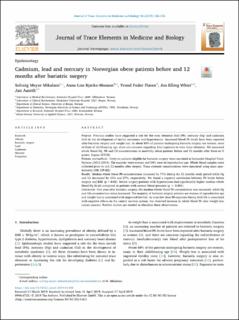| dc.contributor.author | Mikalsen, Solveig Meyer | |
| dc.contributor.author | Monsen, Anne Lise Bjørke | |
| dc.contributor.author | Flaten, Trond Peder | |
| dc.contributor.author | Whist, Jon Elling | |
| dc.contributor.author | Aaseth, Jan | |
| dc.date.accessioned | 2020-03-26T08:51:45Z | |
| dc.date.available | 2020-03-26T08:51:45Z | |
| dc.date.created | 2019-06-18T13:28:09Z | |
| dc.date.issued | 2019 | |
| dc.identifier.citation | Journal of Trace Elements in Medicine and Biology. 2019, 54 150-155. | en_US |
| dc.identifier.issn | 0946-672X | |
| dc.identifier.uri | https://hdl.handle.net/11250/2648757 | |
| dc.description.abstract | Purpose Previous studies have suggested a role for the toxic elements lead (Pb), mercury (Hg) and cadmium (Cd) in the development of insulin resistance and hypertension. Increased blood Pb levels have been reported after bariatric surgery and weight loss. As about 80% of patients undergoing bariatric surgery are women, most of them of childbearing age, there are concerns regarding fetal exposure to toxic trace elements. We measured whole blood Hg, Pb and Cd concentrations in morbidly obese patients before and 12 months after Roux-en-Y gastric bypass (RYGB). Patients and methods Forty-six patients eligible for bariatric surgery were recruited at Innlandet Hospital Trust, Norway (2012–2014). The majority were women and 54% were of reproductive age. Whole blood samples were collected prior to and 12 months after surgery. Trace element concentrations were measured using mass spectrometry (HR-ICP-MS). Results Median whole blood Pb concentrations increased by 73% during the 12 months study period while Hg and Cd decreased by 31% and 27%, respectively. We found a negative correlation between Pb levels before surgery and BMI (p = 0.02). Before surgery patients with hypertension had significantly higher median whole blood Hg levels compared to patients with normal blood pressure (p < 0.001). Conclusion One year after bariatric surgery, the median whole blood Pb concentration was increased, while Hg and Cd concentrations were decreased. The majority of bariatric surgery patients are women of reproductive age and weight loss is associated with improved fertility. As even low dose Pb exposure during fetal life is associated with negative effects on the central nervous system, the observed increase in whole blood Pb after weight loss causes concern. Further studies are needed to elucidate these observations. | |
| dc.language.iso | eng | en_US |
| dc.relation.uri | http://hdl.handle.net/11250/2636359 | |
| dc.rights | Attribution-NonCommercial-NoDerivatives 4.0 Internasjonal | * |
| dc.rights.uri | http://creativecommons.org/licenses/by-nc-nd/4.0/deed.no | * |
| dc.title | Cadmium, lead and mercury in Norwegian obese patients before and 12 months after bariatric surgery | en_US |
| dc.type | Peer reviewed | en_US |
| dc.type | Journal article | en_US |
| dc.description.version | submittedVersion | |
| dc.description.version | publishedVersion | |
| dc.source.pagenumber | 150-155 | en_US |
| dc.source.volume | 54 | en_US |
| dc.source.journal | Journal of Trace Elements in Medicine and Biology | en_US |
| dc.identifier.doi | 10.1016/j.jtemb.2019.04.008 | |
| dc.identifier.cristin | 1705706 | |
| cristin.ispublished | true | |
| cristin.fulltext | preprint | |
| cristin.fulltext | original | |
| cristin.qualitycode | 1 | |

